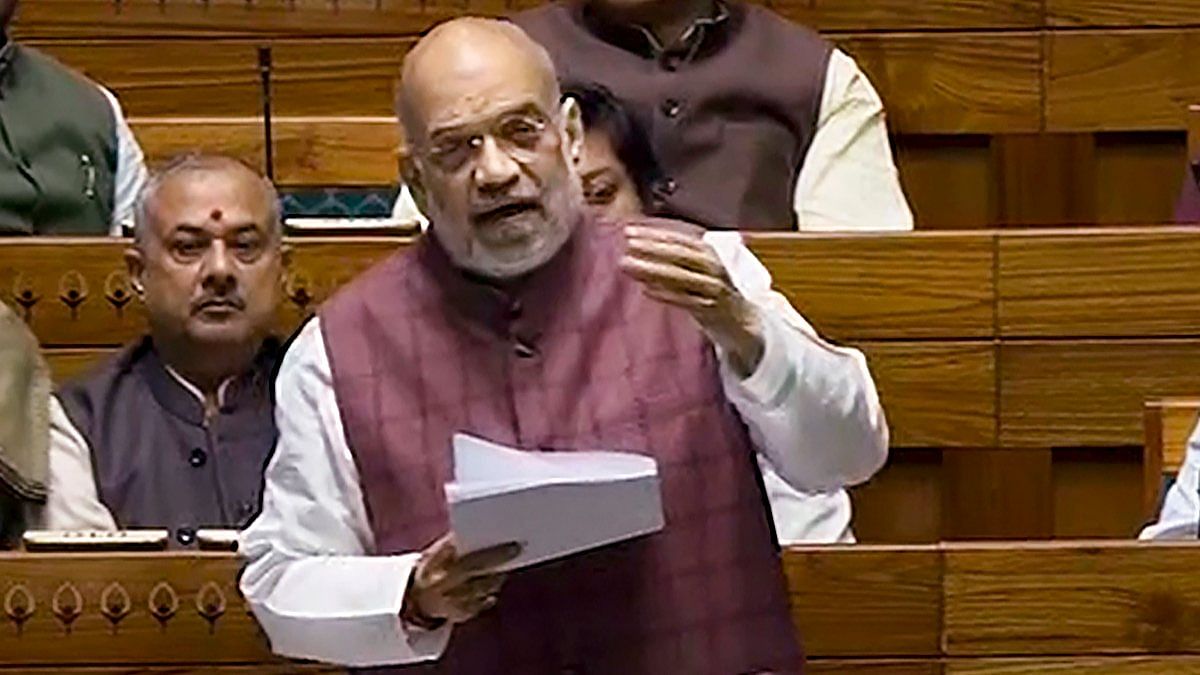New Delhi: Union Home Minister Amit Shah Wednesday blamed India’s first Prime Minister Jawaharlal Nehru for the festering dispute in Kashmir, adding that its escalation to the United Nations and agreeing to a ceasefire with Pakistan in 1948 were two of his “historic blunders”.
Shah was replying to the debate on the Jammu and Kashmir Reorganisation (Amendment) Bill and the Jammu and Kashmir Reservation (Amendment) Bill, which were later passed by the Lok Sabha.
Shah claimed that Nehru, in a letter to prominent Kashmiri politician Sheikh Abdullah, had admitted that “in hindsight” he felt these moves were a “mistake” on India’s part. The home minister added this letter was available in the Nehru Memorial Museum and Library archives.
The Bills were later passed in the House, though the Opposition walked out for a brief period after Shah’s remarks on Nehru.
The Jammu and Kashmir Reorganisation (Amendment) Bill proposes to increase the total number of seats in the Jammu and Kashmir legislative assembly from 83 to 90, of which seven are to be reserved for Scheduled Castes (SC) members and nine for legislators from Scheduled Tribes (STs).
Other features include the power of the lieutenant-governor to nominate up to two members from the Kashmiri migrant community, essentially Kashmiri Pandits, to the legislative assembly, with one nominee being a woman. Additionally, one member representing displaced people from Pakistan-occupied Jammu and Kashmir may also be nominated.
The Jammu and Kashmir Reservation (Amendment) Bill provides for quota in jobs and education to Scheduled Castes, Scheduled Tribes, and Other Backward Classes.
These Bills are aimed at “giving justice” to those who have been “deprived of their rights” for the last 70 years, Shah said, adding he was of the opinion that the Congress would oppose them as the party “can never digest the welfare of the backward classes”.
However, after briefly dwelling on the Bills, Shah trained his guns on the Opposition, which had questioned its motives behind the abrogation of Article 370 in August, 2019, three months after the BJP swept the Lok Sabha polls, winning 303 seats.
Article 370, under which Jammu and Kashmir was granted special status, was at the “root of terrorism”, Shah said Wednesday. The home minister reeled off statistics to make his case, citing how between 2014 and 2023, there were only 2,197 terror incidents in the state, compared to 7,217 between 2004-14 and 40,164 between 1994 and 2004.
“This is a drop of 70 per cent. Also, there has been a 72 percent dip in civilian deaths and 69 percent dip in deaths of security persons. In 2010, there were 2,654 incidents of stone pelting. In 2023, there were none. There were 132 organised hartals in 2010 and zero in 2023. There were 112 civilian deaths due to stone pelting in 2010, zero in 2023. They (Opposition) said there would be a bloodbath in the Valley if Article 370 was abolished, but not so much as a stone was hurled and that is the system the BJP has put in place,” the home minister said.
Shah added that 2010 saw 70 ceasefire violations, compared to “two this year”. “By 2026, a zero-terror plan will be implemented as Narendra Modi will surely return to power in 2024,” he said.
Shah also launched a blistering attack on Nehru, arguing that if he had delayed the 1948 ceasefire even by three days, “PoK would have been in India”.
Shah added that Nehru later wrote to Sheikh Abdullah, saying: “… based on my experience with the UN, I have reached the conclusion that one cannot hope for any satisfying decision there. I felt it was a good decision (ceasefire) but it was not carried out properly. We could have come out with something better. In hindsight, I feel it was a mistake that we committed.”
Speaking before Shah, Congress’ Leader in the Lok Sabha Adhir Ranjan Chowdhury said the Bills were being brought for gerrymandering, which is a term used to describe the redrawing of boundaries of a constituency to favour a particular party.
Chowdhury also claimed that India’s first Home Minister Vallabhbhai Patel had told Pakistan’s first Prime Minister Liaquat Ali Khan that Kashmir could go to Pakistan if India got Hyderabad in exchange. “It was due to Nehru’s long-standing commitment that Kashmir is with us,” Chowdhury said.
As the Congress leader spoke, BJD MP Bhartruhari Mehtab stood up to demand evidence behind his claim. “Your (Mehtab) loyalty to the ruling party must be appreciated,” Chowdhury responded.
(Edited by Tikli Basu)
Also read: BJP high command looking at new faces as CMs in MP, Rajasthan and Chhattisgarh

